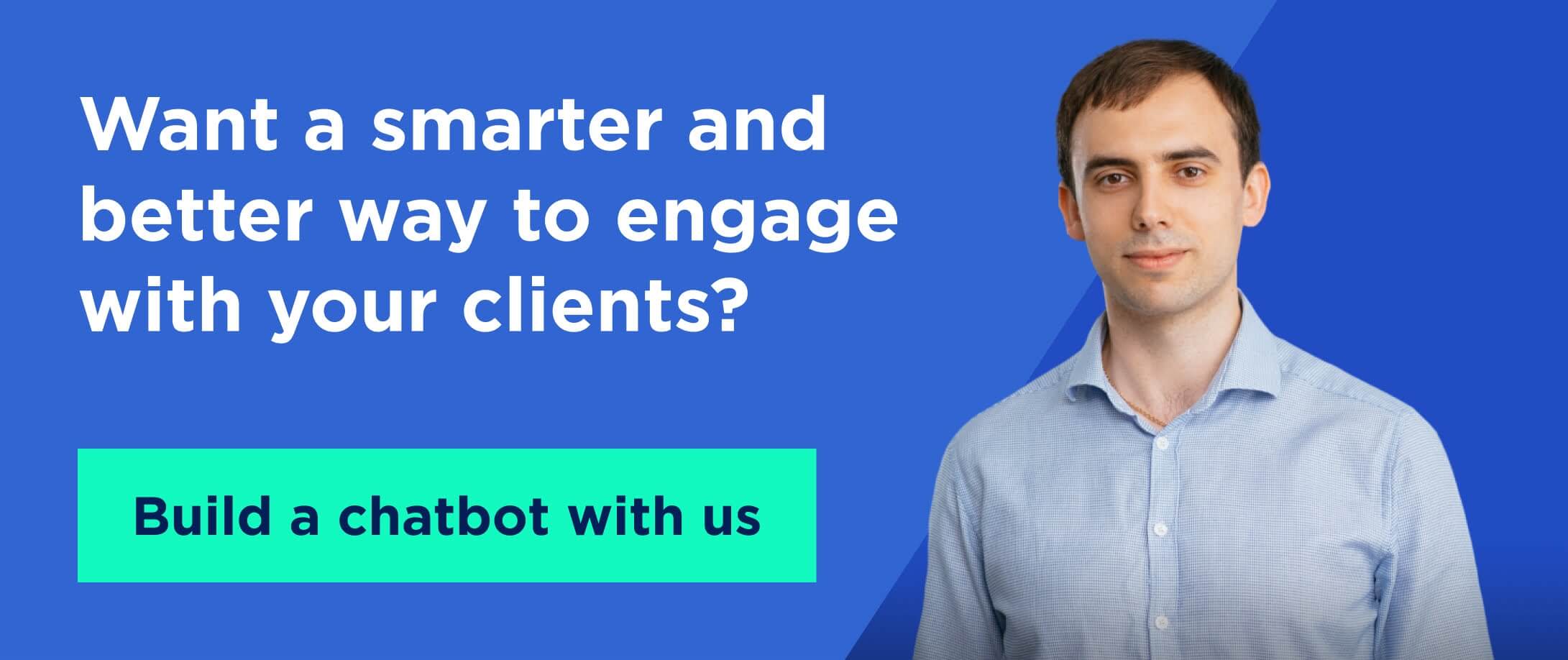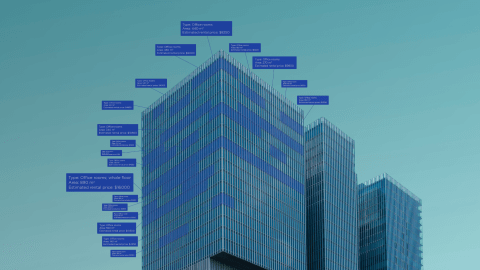By 2027, almost 25% of organizations will adopt chatbots as the core customer service channel, according to Gartner. For years, chatbots have been revolutionizing user experiences by offering round-the-clock support, boosting conversions, and automating routine tasks.
If you are still unsure how to approach chatbot development – we are here to help you. Keep reading to explore key differences between platform-built and custom solutions and find the best fit for your business.
Key differences between platform-built and custom-made solutions
Development time and cost
Most chatbot platforms offer a simple, user-friendly solution for creating and deploying chatbots quickly and with lower upfront costs compared to custom ones. Despite the low upfront costs, such solutions often come with hidden expenses that can add up over time. These include licensing fees and integration costs. While the possibility of quick implementation is a huge benefit, it often comes at the cost of functionality and accuracy.
Although the cost of custom development may seem to be high, especially at the initial stage, this approach can prove to be more cost-effective in the long run. By owning the solution outright, you avoid ongoing licensing fees and are not subject to changes in platform pricing.
Technical expertise
Chatbot platforms come with intuitive interfaces, drag-and-drop functionality, and ready-to-use templates, which means non-technical professionals can easily navigate the process. If you need to quickly deploy chatbots with basic functionality – this approach is the best option for you. For example, product owners with a general vision and idea of the chatbot functionality can handle the implementation.
However, even though chatbot platforms eliminate the need for extensive coding, you will still need some assistance from technical specialists to integrate the chatbot into your existing system.

For more complex solutions that need to meet specific business objectives – a custom chatbot is a must. It requires a higher level of expertise, hence a team of specialists that can manage the process from the start to the end.
As for the experts, when you opt for custom development, you will need to have a business analyst on your board to outline the chatbot’s flow according to your needs. Another expert is a data scientist, who will do the majority of the work, including processing, cleaning, and structuring your data and building program logic. You’ll also have to hire designers who will create the visual appearance, making sure your chatbot is user-friendly and intuitive. A front-end engineer is another integral member of your team who will implement the design, while the back-end engineer will seamlessly integrate the chatbot into your platform.

Ready-made solutions usually offer quick time to market and flexible subscription-based pricing plans. However, with off-the-shelf solutions, hidden long-term costs must be considered before choosing your option. Long-term costs are typically associated with ongoing licensing fees, additional integrations, solution maintenance, and upgrades.
Custom chatbot development requires a considerable amount of initial investment and time associated with the development team and the complexity of the technologies. However, in the long run, custom solutions will prove to be more cost-effective. Custom development covers all your needs, reducing the risks of unexpected licensing expenses.
Data management
Data is the backbone of any chatbot. However, platform-built and custom development have different approaches to managing it.
Ready-made chatbots rely on predefined responses and rules, making them very straightforward to implement. However, this simplicity requires a well-structured and compact knowledge base. Such solutions may produce less accurate and even faulty responses if your data is complex, voluminous, or unstructured.
The secret to a high-performing chatbot lies in a meticulously structured database. With custom development, the real advantage comes in the flexibility to tailor solution architecture and data organization, ensuring a chatbot meets client’s specific demands. Most custom chatbot development providers have an established setup to design the chatbot quickly. They devote around 80% of the development time to preparing your data for the project – cleaning, structuring, and organizing it. By focusing more on data, developers ensure your custom chatbot can handle complex interactions and provide highly accurate responses.

Security and compliances
Some industries, such as healthcare and energy, require high security, precision, and adherence to specific compliance standards. While chatbot platforms provide great tools for the quick launch of chatbots, they fall short of meeting the requirements of highly regulated industries. Many platforms have limitations that make it challenging to bring a chatbot into compliance with all necessary industry standards and data security rules.
On the other hand, custom-made chatbots can be tailored to meet any specific security requirements or compliance needs of your industry. When developing a solution, all the focus is on data; this ensures the accuracy and reliability of the chatbot. For instance, if you work in the healthcare domain, developers can build an MDR, HIPAA, DIGGA, and ISO 13485:2016 compliant chatbot.
Customized responses
Many chatbot platforms provide only basic functionality, struggling to deliver contextually relevant answers. It happens because ready-made chatbots rely on pre-programmed responses and scripts. They have a poor understanding of the intentions behind the users’ queries, which can lead to poor responses and undermine a brand's reputation.
Custom chatbots provide personalized responses based on a full semantic understanding of the user’s inquiry. With this ability, a chatbot can offer additional products or services that match the person's interests. Custom solutions can also be adapted at the query level to mitigate any bias and personalize chatbot responses based on user input and context. For example, we developed an FAQ chatbot for a German power plant certification company with built-in thresholds that offer hints for users, such as alternative phrasing, if it doesn’t have the relevant answer to the customer inquiry.
Integration capabilities
Each chatbot platform comes with a predefined set of capabilities and restrictions to ensure the stability of the chatbot. In terms of integrations, most platforms focus on major business tools like CRMs, CMSs, and popular apps to cover the basic needs of the business.
If your business uses less common or custom systems or apps, there is little chance that the ready-made chatbot may offer integration possibilities. In this case – opt for custom development. Customized solutions provide more flexibility as your chatbot can be integrated with any specialized software or tool.
Scalability
All platform-based chatbots have built-in limits on how much traffic they can handle. Although some platforms may allow you to exceed these limits, it usually comes at an additional cost. The standardized nature of platform-based chatbots makes them hard to scale and adapt to business growth.
Custom-built solutions offer greater flexibility than ready-made ones. Developers can optimize the chatbot architecture, implement cloud solutions, and choose the most suitable databases to ensure stable performance even when traffic increases. This makes chatbots ideal for companies that expect significant growth or need to handle large volumes of user interaction.
| Factor | Platform-built chatbot | Custom-made chatbot |
| Cost | Subscription-based, higher in the long run | High initial costs, cost-efficient in the long run |
| Development time | 20 - 40 hours | 80 - 120 hours |
| Technical expertise | Demands minimal expertise | Requires a team of specialists |
| Data management | Limited data capabilities | Can process large volumes of data |
| Security and compliance | Has limitations in meeting security or industry standards | Flexible enough to comply with specific regulations and standards |
| Customized responses | Limited | Highly personalized |
| Integration capabilities | Pre-built integrations for common tools | Easy to integrate with any platform |
| Scalability | Limited scalability | Highly scalable |
When to choose a platform-built solution?
Ready-made chatbots will fit you if:
- You are working under a tight budget and deadline. However, be ready that over time the price of your subscription can grow substantially.
- Your knowledge base is well-structured and relatively compact.
- You want to cover very basic user inquiries. Chatbot platforms are great for developing FAQ chatbots or other customer support solutions.
- Your industry is not highly regulated and does not require a high level of accuracy.
When to choose a custom solution?
Choose custom chatbot development if:
- You have a large amount of unstructured data you need to use for a chatbot. With custom development, you will have access to the best data experts to handle it for you.
- You need a chatbot for answering complex user queries, providing highly accurate responses and personalized recommendations.
- Your business operates in such sectors as healthcare, energy, finances, and law, requiring a high level of precision.
- You need a highly scalable solution that can handle the growing amount of data and high volumes of user interaction.
Summing up

Both ready-made and custom solutions have their advantages and disadvantages. Although a no-code solution is easy to use, cheaper, and meets basic business needs, it has a number of limitations that affect its scalability. On the other hand, a custom chatbot will cost you more and take longer to deploy, but in the long run it will prove to be more cost-effective. You’ll also get flexible and customized solutions with high accuracy.
Whether you're looking to update an existing chatbot or build a completely new one from the ground up, the Lemberg Solutions team can help – contact us today to discuss your needs.




